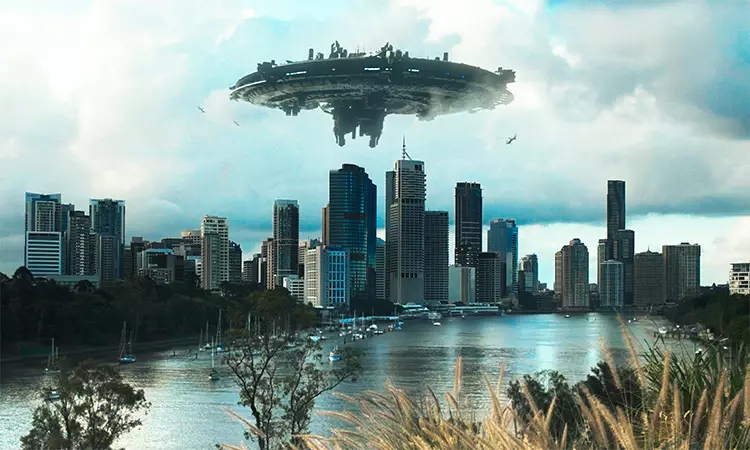In Brian Hanson’s sci-fi thriller, *The Bunker*, earth faces a formidable extraterrestrial challenge as colossal spaceships hover ominously above major cities. These immense craft unleash smaller probes, tasked with infiltrating military sites and invoking psychological turmoil in the populace. Under immense pressure, U.S. authorities fortify humanity’s response by isolating a team of five scientists and a military commander in separate, secured bunkers. Their singular mission: to engineer a bioweapon targeting the hostile ‘Travelers’ while ensuring human safety. This high-stakes scenario paves the way for a reflection on the themes of alien confrontation, psychological strain, and the subjective nature of reality.
Hanson’s narrative draws heavily from influences within the alien invasion genre, echoing classics such as Robert Wise’s *The Andromeda Strain*, Neill Blomkamp’s *District 9*, and Denis Villeneuve’s *Arrival*. These comparisons enhance the exploration of whether the unknowns should provoke fear or be embraced as allies. Moreover, *The Bunker* is forged in the context of the collective social isolation precipitated by the Coronavirus pandemic, using it as a backdrop for its characters’ mental struggles. Dr. Michele Riley, a microbiologist portrayed by Chelsea Edmundson, embodies this sense of confinement and helplessness. Grappling with feelings of detachment from her loved ones, Michele becomes a microcosm of societal anxiety, existing in a world where connection is severed and isolation reigns.
Michele serves not only as the film’s focal point but as an embodiment of multifaceted struggles arising from isolation. Her experiences take a dark turn as hallucinations, anxiety, and her unresolved familial issues converge. As she confronts nightmarish visions marked by bloodshed, and dialogues with her father who may or may not be alive, Michele’s reality begins to blur. This emotional turmoil is compounded by her interactions in the bunker; she contends with male colleagues who undermine her authority and validate her fears of inadequacy.
The introduction of horror icons Tony Todd and Tobin Bell, playing male authority figures, solidifies this tension as they represent patriarchal structures bearing down on her psyche. The synaptic confusion manifested when both characters engage with Michele simultaneously signifies her spiraling mental state, challenging her assertion of identity and authority in a male-dominated space.
A central intrigue of *The Bunker* lies in whether Michele’s descent into madness is solely a product of her isolation or an external manipulation by the alien entities. This duality raises questions regarding agency and the nature of reality—whether an individual’s psychological unraveling can stem from environmental pressures or be a result of alien influence. This ambiguity is particularly poignant, mirroring Michele’s struggle against not only her inner demons but also the potential external forces at play.
If the ‘Travelers’ utilize mind control as a weapon, Michele’s journey morphs into a dual battle against the oppression of both her physical environment and mental state. This narrative complexity imbues the film with deeper layers of meaning, transforming it into an allegorical landscape of survival and self-determination in the face of existential threat.
Ultimately, *The Bunker* emerges as a feminist film wherein Michele’s “otherness” is not simply a narrative constraint but a source of strength. Her resilience is anchored in the types of empowerment that arise from recognizing her own value against adversities – both societal and extraterrestrial. As she learns to navigate challenges presented by her colleagues and the alien threat, Michele’s journey reflects a reclamation of agency, turning her into a symbol of fortitude that challenges patriarchal structures.
Brian Hanson’s *The Bunker* is more than a reflection on alien invasions; it is a nuanced exploration of psychological fragility and the quest for personal autonomy amid daunting uncertainties. The narrative intertwines horror, feminist themes, and existential angst, ultimately crafting a compelling examination of how identity is tested under duress. Within its genre constraints, it extends an invitation for viewers to engage with the deeper facets of isolation, authority, and the relentless pursuit of self amidst chaos.

